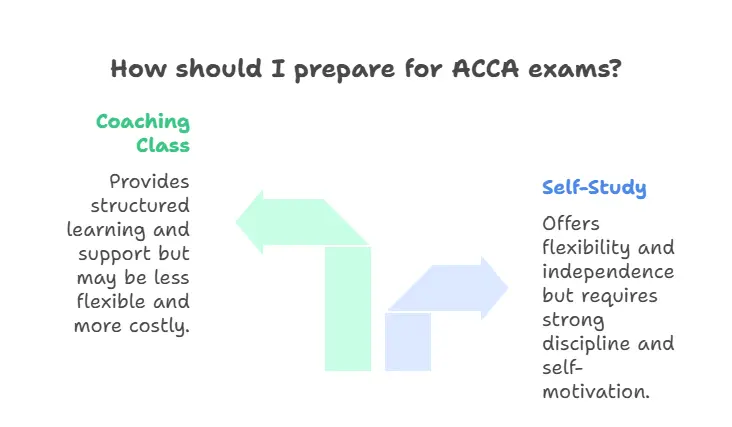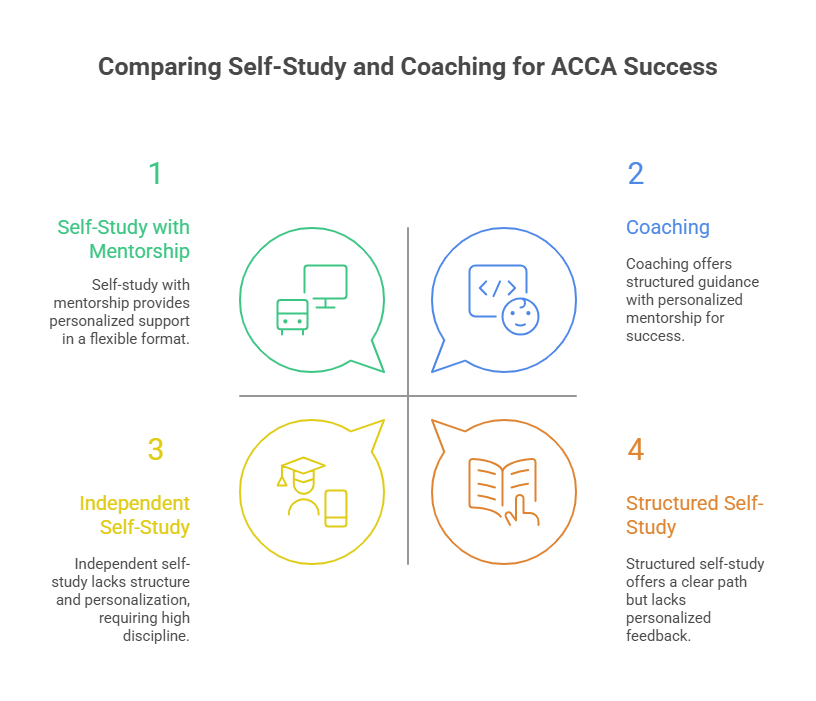Table of Contents
Choosing how to prepare for your ACCA exams can be a tough decision. Should you go for self-study, where you have full control over your schedule, or join a coaching class for structured guidance? Both options have their pros and cons, and the right choice depends on your learning style, discipline, and goals. In this blog, we’ll break down the key differences to help you decide which method works best for you.
Introduction
The ACCA qualification is one of the most respected accounting credentials in the world. It opens doors to a wide range of career opportunities in finance, auditing, taxation, and management. However, preparing for ACCA exams can be quite challenging, as it requires both a deep understanding of concepts and consistent study habits.
When it comes to preparing, students often wonder whether they should study on their own or join a coaching class. Both options can lead to success — it all depends on your personal learning style, discipline, and the level of support you need. In this blog, we’ll explore both self-study and coaching methods to help you decide which one suits you best.
What is ACCA?
1: Accounting provides information on
The Association of Chartered Certified Accountants (ACCA) is a globally recognized professional qualification in accounting and finance. It helps students build strong knowledge in financial management, auditing, taxation, and business strategy.
The ACCA program is designed to prepare students for real-world roles in accounting and finance. It consists of different exam levels — Applied Knowledge, Applied Skills, and Strategic Professional — which test both technical understanding and professional judgment.
One of the biggest advantages of ACCA is its international recognition. Once qualified, you can work in various countries and industries, as ACCA is valued by employers worldwide. Whether you dream of becoming an auditor, financial analyst, or finance manager, ACCA gives you the foundation and credibility to grow in your career.
Placement Oriented PWC Business Accounting Course
PWC Certified Business Accounting Course by Entri App: Master in-demand skills, ace interviews, and secure top-tier jobs.
Join Now!What is Self-Study for ACCA?
Self-study for ACCA means preparing for the exams on your own without attending formal coaching classes. You take full responsibility for your learning by using study materials like ACCA-approved textbooks, online notes, video lectures, and practice papers. Many students choose self-study because it offers freedom and flexibility — you can decide when and how to study based on your own routine.
However, self-study also requires a lot of self-discipline. You need to plan your study schedule, stay consistent, and track your own progress. Since there’s no teacher or fixed class time, managing your time effectively becomes very important. With the right mindset, self-study can be just as successful as coaching — especially for students who are motivated and organized.
Benefits of Self-Study
1. Learn at your own pace: You can study at a speed that suits your comfort and understanding. If a topic is difficult, you can spend more time on it without pressure.
2. Save on coaching fees: Self-study is budget-friendly since you don’t have to pay for coaching classes. You only need to invest in books and online resources.
3. Build independent learning habits: Studying on your own helps you develop self-discipline, problem-solving skills, and confidence — qualities that are valuable even in your professional life.
4. Flexibility to plan your schedule: You have complete control over your timetable. You can study whenever you’re most focused, whether early in the morning or late at night.
Challenges of Self-Study
1. Requires strong motivation: Without a teacher or set routine, it can be easy to lose focus or postpone studying. You need to push yourself consistently.
2. Limited guidance when stuck: If you face a difficult concept, finding the right explanation on your own can take time. There’s no immediate help or feedback.
3. Difficult to stay consistent: Staying on track can be hard when you’re managing everything yourself — from planning to revision.
4. Can feel isolating: Studying alone can sometimes feel lonely since you don’t have classmates or mentors to share doubts or experiences with.
What is ACCA Coaching?
ACCA coaching involves studying under the guidance of professional tutors who are experienced in teaching ACCA subjects. Coaching can be done either in traditional classrooms or through online classes, depending on what suits you best. These programs follow a structured study plan that covers the entire syllabus in a systematic way.
In coaching, you get access to detailed study materials, regular doubt-solving sessions, and continuous support from teachers. This helps students who prefer organized learning and need motivation to stay consistent. Coaching is especially useful for those who find it difficult to study on their own or want expert insights to strengthen their understanding of complex topics.
Benefits of ACCA Coaching
1. Expert tutors and mentorship: You learn directly from experienced professionals who understand ACCA exams and can explain even the toughest topics clearly.
2. Doubt-solving and feedback: You can get your questions answered immediately and receive feedback on your performance, helping you improve faster.
3. Peer interaction and motivation: Studying with classmates keeps you motivated. You can discuss concepts, share study tips, and feel part of a learning community.
4. Regular tests and progress tracking: Coaching centers conduct mock tests and progress assessments, helping you stay exam-ready and identify areas that need improvement.
Challenges of ACCA Coaching
1. Higher cost: Coaching programs can be expensive, as they include tuition fees, materials, and sometimes travel expenses.
2. Fixed schedules (less flexibility): You have to follow the class timetable, which might not always fit your personal routine or study pace.
3. May depend too much on tutors: Some students might rely heavily on teachers and not develop independent study habits, which can be a disadvantage during self-revision.
Key Differences: ACCA Self-Study vs Coaching
Here’s a simple comparison to help you clearly understand how Self-Study and Coaching differ when preparing for ACCA:
| Factor | Self-Study | Coaching |
|---|---|---|
| Cost | More affordable, mainly requires buying books and resources. | Higher cost due to tuition fees and study materials. |
| Flexibility | Full control over your schedule and study pace. | Fixed class timings and structured schedules. |
| Guidance | You learn independently with limited external help. | Direct access to expert tutors and mentorship. |
| Study Material | You choose your own materials and resources. | Coaching provides curated notes and study kits. |
| Discipline | Requires self-motivation and strong time management. | Built-in structure helps maintain consistency. |
| Doubt Solving | May take time to find answers or clarity online. | Immediate clarification from tutors. |
| Peer Support | Mostly a solo learning experience. | Learn and discuss with classmates. |
| Mock Tests | You have to arrange and review them yourself. | Regular mock tests and feedback from teachers. |
| Learning Style | Best for self-driven, organized learners. | Ideal for students who prefer guided learning. |
Placement Oriented PWC Business Accounting Course
PWC Certified Business Accounting Course by Entri App: Master in-demand skills, ace interviews, and secure top-tier jobs.
Join Now!Key Factors to Consider: Self-Study vs Coaching
Both self-study and coaching have their strengths. If you’re disciplined, self-motivated, and can learn independently, self-study can be a rewarding and cost-effective choice. But if you prefer structured guidance, consistent motivation, and expert mentorship, coaching might be the better path. Choose based on your personality and learning style — that’s the real key to success in ACCA.
1. Conceptual Clarity
Self-Study: When you study on your own, understanding concepts depends on how well you can interpret the materials. You’ll rely on textbooks, online videos, and notes. This can work well if you’re good at self-learning and enjoy exploring topics in depth. However, if you get stuck on a difficult concept, finding the correct explanation may take more time.
Coaching: In coaching classes, conceptual clarity is easier to achieve because you learn directly from experienced tutors. They can explain tricky topics with examples, guide you through complex areas, and clear doubts instantly. The structured teaching style helps build a stronger foundation, especially for students who struggle to study independently.
2. Discipline and Consistency
Self-Study: This is where self-study becomes challenging. You are fully responsible for planning your study routine and sticking to it. It’s easy to lose focus or skip topics without accountability. Self-study works best for highly disciplined students who can manage their time and stay consistent without external pressure.
Coaching: Coaching helps maintain discipline because classes follow a fixed schedule. Regular lectures, assignments, and progress tracking keep you consistent. Even if your motivation drops, the structure of coaching ensures that you continue moving forward. This is ideal for students who need an external push to stay on track.
3. Right Approach to Study
Self-Study: Developing the right approach during self-study takes experience. You need to plan your syllabus coverage, identify exam trends, and find the right materials yourself. This gives flexibility but also means you might spend extra time figuring out what works best.
Coaching: Coaching provides a ready-made approach. Tutors know the exam patterns, important topics, and time management techniques. You get a clear roadmap from the start, which saves time and helps you focus on what really matters for the exams.
4. Mock Tests and Mentorship
Self-Study: Mock tests are available online, but you’ll have to evaluate your own performance. Without guidance, it may be hard to know where you’re going wrong or how to improve. The lack of personalized feedback can slow your progress.
Coaching: In coaching, mock tests are a regular part of the program. You get evaluated by tutors who provide detailed feedback on your weak areas and exam strategies. Mentorship plays a big role here — having someone experienced to guide you through your preparation builds confidence and improves your performance.
ACCA Support for Self-Study Students
One of the best things about ACCA is that it supports students who prefer to study on their own. You don’t necessarily need to join a coaching class — ACCA offers several online tools and resources that help you learn effectively, stay on track, and prepare like a pro. Here are the key platforms designed to make self-study easier and more effective:
1. ACCA Study Hub
The ACCA Study Hub is a free online learning platform that gives you access to official ACCA study materials. It includes interactive lessons, practice questions, and explanations designed by ACCA experts. You can study at your own pace, track your progress, and revise anytime, anywhere. This tool is perfect for students who want structured yet flexible learning.
2. ACCA Practice Platform
The Practice Platform allows you to experience the real exam environment before your actual exam day. You can attempt past papers, practice under timed conditions, and get familiar with the computer-based exam layout. This platform helps build exam confidence and improves your time management skills.
3. Examiners’ Platform
Through the Examiners’ Platform, ACCA provides valuable insights from actual examiners. You get to understand common student mistakes, examiner feedback, and tips on how to approach different question types. This is an excellent resource to learn what examiners expect and how to improve your answers accordingly.
4. ACCA Learning Community
The ACCA Learning Community connects you with other ACCA students and professionals around the world. It’s an online space where you can share ideas, ask questions, and get support from peers and mentors. Being part of this community helps you stay motivated and learn collaboratively, even if you’re studying independently.
ACCA makes self-study much easier through these official platforms. With the right use of these tools — from structured study materials to real exam practice and community support — self-study students can prepare effectively and confidently succeed in their exams.
Which Option is Right for You: ACCA Self-Study Vs Coaching?
Both self-study and coaching can help you succeed in ACCA. The important thing is to choose the method that matches your learning style and personality. Everyone learns differently — some prefer independence, while others do better with guidance and structure.
Choose Self-Study if you are self-motivated, disciplined, and enjoy learning at your own pace. It’s a great choice if you like flexibility and want to manage your own study schedule. Self-study also helps you save money and build strong independent learning habits.
Choose Coaching if you need structured guidance, regular feedback, and personal support from experienced tutors. Coaching is ideal for students who prefer an organized study plan, scheduled classes, and the motivation that comes from learning in a group environment.
In the end, there’s no single “right” option — the best choice is the one that helps you stay focused, confident, and consistent throughout your ACCA journey. Study smart, stay disciplined, and keep your goals in sight.
Become an Accounting Pro – Learn from Industry Experts!
Conclusion
Choosing between self-study and coaching for ACCA depends entirely on your personal learning style, discipline, and comfort level. Both methods can lead to success if you stay focused and consistent.
If you’re self-driven, organized, and enjoy learning independently, self-study can be a flexible and cost-effective option. But if you prefer structured learning, regular feedback, and expert guidance, coaching can give you the direction and motivation you need.
At the end of the day, what truly matters is your commitment, consistency, and smart preparation. Whether you study alone or with a tutor, stay dedicated to your goals and make the best use of ACCA’s resources — that’s the real key to success.
Placement Oriented PWC Business Accounting Course
PWC Certified Business Accounting Course by Entri App: Master in-demand skills, ace interviews, and secure top-tier jobs.
Join Now!Frequently Asked Questions
Can I pass ACCA exams through self-study?
Yes, you can definitely pass ACCA exams through self-study. Many students succeed this way by following a proper study plan, using ACCA-approved materials, and practicing past papers regularly. However, it requires strong discipline, consistency, and time management skills.
Is coaching necessary for ACCA?
Coaching is not mandatory for ACCA, but it can be helpful. Coaching provides expert guidance, structured study plans, and regular feedback, which make learning easier for students who prefer organized support. It’s especially useful if you struggle with motivation or find some topics difficult to understand on your own.
Which is more cost-effective: self-study or coaching?
Self-study is more cost-effective since you only need to pay for registration, books, and exam fees. Coaching, on the other hand, involves additional tuition fees, which can be expensive. If budget is a concern and you can stay disciplined, self-study may be the better choice.
How do I stay motivated while doing self-study for ACCA?
To stay motivated, set small study goals, follow a fixed schedule, and track your progress regularly. Use online study groups, ACCA forums, and communities to stay connected with other students. Taking short breaks and rewarding yourself after completing each topic also helps keep you focused.
What are the main benefits of joining ACCA coaching?
The main benefits of coaching include expert-led classes, instant doubt clarification, structured lessons, mock tests, and mentorship. Coaching also helps build consistency since classes follow a fixed timetable, keeping you on track throughout your preparation.
Can I switch from self-study to coaching later?
Yes, absolutely. Many students start with self-study to get familiar with the syllabus and later join coaching for advanced papers or exam revision. You can always combine both methods depending on your comfort level and progress.
What resources does ACCA provide for self-study students?
ACCA offers excellent tools for self-learners, such as the ACCA Study Hub, Practice Platform, Examiners’ Insights, and the ACCA Learning Community. These resources help students understand concepts, practice in real exam conditions, and connect with peers for guidance.
Which option is better for beginners — self-study or coaching?
For beginners, coaching can be a good start since it provides a clear understanding of the basics and builds a strong foundation. Once you’re confident with the study approach and exam pattern, you can continue with self-study for later levels if you prefer more flexibility.













